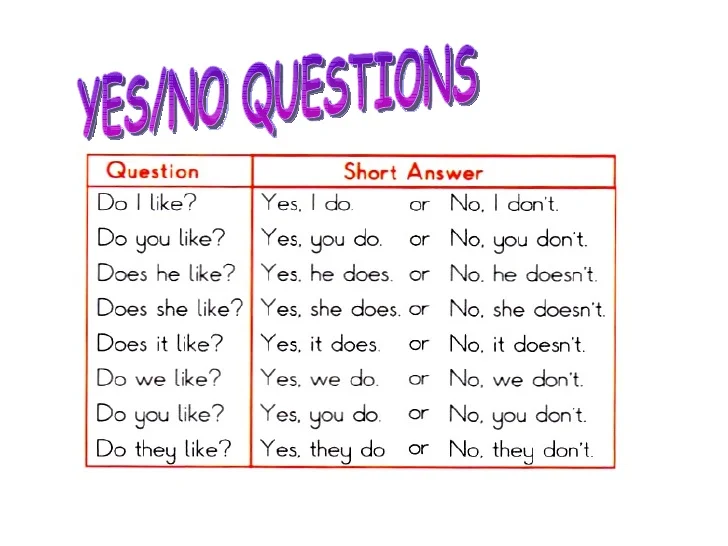There are many types of questions in English. The easiest are questions that can be answered “yes” or “no.”
A: Are you from around here?
B: Yes, I am. A: Do you come here often?
B: Yes, I do. A: Can I buy you a drink?
B: No, thanks. A: Are you married?
B: Yes, I am.

To form a question from a statement, first count the number of verbs.
| John is a doctor. | One verb: is (be) |
| Jane drives a sports car. | One verb: drives |
| Joan played basketball last night. | One verb: played |
| Jan is eating her dinner. | Two verbs: is eating |
| June has rented an apartment. | Two verbs: has rented |
| Jen has been living there since 1969. | Three verbs: has been living |
If there is one verb in the statement and the verb is a form of be, simply switch the positions of the subject and verb.
| Statement | Question |
| John is a doctor. | Is John a doctor? |
| The Jensens are here. | Are the Jensens here? |
If there are two verbs, simply switch the positions of the subject and first verb.
| Statement | Question |
| Jan is eating dinner. | Is Jan eating dinner? |
| June has rented an apartment. | Has June rented an apartment? |
| Jen has been living here since 1969. | Has Jen been living here since 1969? |
If there is one verb, and the verb is not a form of be, the process is more complex.
1. Add Do to the beginning of the sentence.
| The Johnsons live in that house. | Do the Johnsons live in that house? |
2. If the main verb “carries” a third person singular s, move the s to Do, making it Does.
| Jane drives a car. | Do Jane drives a car? (Not finished yet!) |
| Does Jane drive a car? (Good question!) |
3. If the main verb “carries" past tense, move the past tense to Do, making it Did.
| Joan played basketball last night. | Do Joan played basketball? (Not finished yet!) |
| Did Joan play basketball? (Good question!) |
In conversation, most questions are asked of the second person (you) and answered in the first (I).
A: Are you from California?
B: No, I’m from Oregon. Are you?
A: Yes, I’m from Hollywood.
B: Do you know any movie stars?
A: No, I don’t go out at night.
In British English, the main verb have sometimes functions like be in questions. This is not common in American English.
| Statement | Question |
| You have a pet ferret. | Have you a pet ferret? (British) |
| Do you have a pet ferret? (American) |